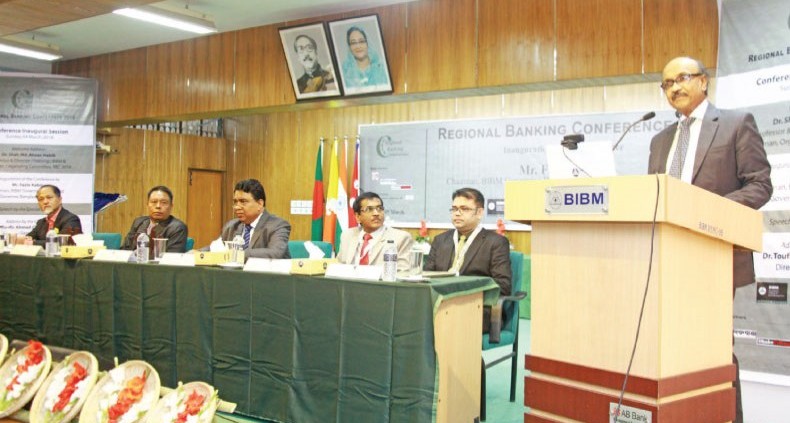Publish names of wilful loan defaulters, enforce laws
Bangladesh Bank governor Fazle Kabir speaks at the inaugural session of a two-day Regional Banking Conference 2018 jointly organised by Bangladesh Institute of Bank Management, Financial Institutions Training Institute of Bhutan, National Institute of Bank Management of India and National Banking Institute of Nepal at the BIBM in Dhaka on Sunday. BIBM director general Toufic Ahmad Choudhury was also present, among others. — New Age photo
Publish names of wilful loan defaulters, enforce laws
Experts at a conference on Sunday suggested that Bangladesh should adopt the practices including disclosure of names of the wilful defaulters and enforcement of rules that India and Nepal follow to deal with banks’ non-performing loans.
They made the suggestion while speaking at the business session on the opening day of a two-day Regional Banking Conference 2018 that began at the Bangladesh Institute of Bank Management in Dhaka.
They also said the government’s strategy to allow new banks to create competition among them and spread banking activities across the country and in the process bring the rural people under financial inclusion has failed.
BIBM supernumerary professor Md Yeasin Ali said, ‘We should learn good practices from each other.’
‘To tackle the non-performing loans, India publishes names of the wilful defaulters,’ he said.
Apart from that, the wilful defaulters are barred from opening any new ventures for five years, Yeasin said.
In China, air and train tickets are not sold to the defaulters as punitive measures of the government and to shame the wilful defaulters, he said. He also mentioned that Nepal’s NPL was below two per cent, which was exemplary for other countries.
Speaking about the Nepal’s NPL ratio, former Bangladesh Bank governor Mohammed Farashuddin said, ‘Nepal has a very stringent law and they apply it.’
In Bangladesh, the combination of statutory reserve ratio and cash reserve ratio is 19 per cent, while the figure is 26 per cent in Nepal, he said.
Mentioning that the problem in the Bangladesh’s banking system started during 1991-1992, the former BB governor said that the capacities of the banks did not enhance and quality was not ensured.
Speaking about publishing names of the wilful defaulters, National Institute of Bank Management, India director KL Dhingra said that the list of the wilful defaulters was made by banks not by the central bank.
On the slowdown of Indian economy, he stated that the country’s deposit increase was once tardy due to financial problems.
Nepal’s Sanima Bank chief executive officer Bhuvan Kumar Dahal said that the country’s mortgage sanction manner was very a whole lot centralised that additionally helped the us of a preserve NPL to a very low level.
Besides, banks are supposed to write off loans if the loans continue to be unpaid for one year and the defaulters’ statistics are preserved at
the savings records bureau, he said.
The process creates issues no longer only for the defaulters but also for their household contributors to get loans from banks in future, he said.
BIBM professor and director Shah Md Ahsan Habib, its companion professors Mohammed Sohail Mustafa and Mohammad Tazul Islam prepared a united states paper on Bangladesh titled ‘a review of the activities and overall performance of the banking sector of Bangladesh’.
Mentioning NPL a key subject particularly these of the state-owned banks, Habib stated that the cutting-edge evidences published quite a few instances of wilful default by using a section of big borrowers.
Regular recapitalisation of state-owned banks has emerged as a motive of nervousness that demands on the spot board-based corrective movements and legal measures, he observed.
Pointing out trade-based money laundering a developing concern for the policymakers and central banks at some stage in the globe, he said that enchancment in potential to put in force anti-money laundering regulations and the capability to increase pink flags in the context of the u . s . a . were vital.
Mentioning the low NPL in Nepal, Dhaka University business studies branch dean Shibli Rubayat Ul Islam said the united states (Nepal) suffered trouble but managed to overcome troubles within two many years and the way they overcame have to be observed by Bangladesh. He, however, said, ‘Yes, there are problems in the country’s banking system, however the achievements of the quarter are an awful lot higher than the flows.’ He also recommended that the South-Asian international locations have common foreign money for boosting the commercial enterprise possibilities and to keep away from losses due to replacing currencies. Bangladesh Bank chief economist Faisal Ahmed noted heavy dependency on banking, cyber risk, financial inclusion, product innovation and believe as the challenges of the regional countries. BB governor Fazle Kabir inaugurated the conference mutually organised by BIBM, Financial Institutions Training Institute of Bhutan, National Institute of Bank Management of India and National Banking Institute of Nepal.
At the inaugural session, Kabir said, ‘Sharing of knowledge and experiences of others will certainly help us a lot in this regard.’ He also said in this age of globalisation, regional cooperation is really very important. BIBM director general Toufic Ahmad Choudhury and Association of Bankers Bangladesh chairman Sayed Mahbubur Rahman also spoke, among others, on the occasion.


Leave a Reply
Want to join the discussion?Feel free to contribute!